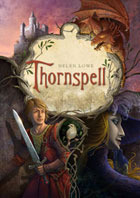Sense of Place 2
 On Thursday I also posted about Sense of Place, mainly discussing it in the context of Haarth, The Wall of Night series world.
On Thursday I also posted about Sense of Place, mainly discussing it in the context of Haarth, The Wall of Night series world.
Luke commented saying: "Do you think it's easier to achieve a strong sense of place in an alternate world, like Haarth in "The Heir of Night", as opposed to "Thornspell" which you have said in a number of places is pretty much this world and 'almost but not quite' Holy Roman Empire?"
I have reflected on this a little and overall I don't think it is "easier." At one level, creating an alternate world may give you more freedom to create things the way you want, but conversely, choosing places within this world for your setting leaves you free to draw out the details that support your story and focus on other aspects of the story.
Using Thornspell as an example, sense of place is still very strong there–in the opening sequence where Sigismund first encounters the enchanted wood, and the later forest of Thorn; in the description of the sleeping palace and also the capital city of 'kingdom not so very far away' where the story is set.
 Thornspell has an historical setting, but I can also think of some contemporary urban fantasies where the use of real-world places are used to powerful 'world building' effect. Neil Gaiman's American Gods would be one for me, also Tim Powers' Las Vegas and Los Angeles in Last Call and Expiration Date respectively. In terms of almost-but-not-quite-this-contemporary-world building, I personally don't think you can go past Robin McKinley's urban fantasy, Sunshine, or Charles De Lint's Newport, the setting for many of his novels, all of which have a unqiuely North american flavour
Thornspell has an historical setting, but I can also think of some contemporary urban fantasies where the use of real-world places are used to powerful 'world building' effect. Neil Gaiman's American Gods would be one for me, also Tim Powers' Las Vegas and Los Angeles in Last Call and Expiration Date respectively. In terms of almost-but-not-quite-this-contemporary-world building, I personally don't think you can go past Robin McKinley's urban fantasy, Sunshine, or Charles De Lint's Newport, the setting for many of his novels, all of which have a unqiuely North american flavour …
…
In all these stories the sense of place is very strong, almost a character in its own right, and I feel that this sort of world building would have taken considerable imagination and craft. And I know that I personally put as much care into the world building aspect of Thornspell as I did with both The Heir of Night and The Gathering of the Lost. So my 'long answer' to your excellent question, Luke, is that I don't think it is necessarily easier, just different—and as always, with (imho) good fiction, driven by the needs of the story, not the preferences of the author.



